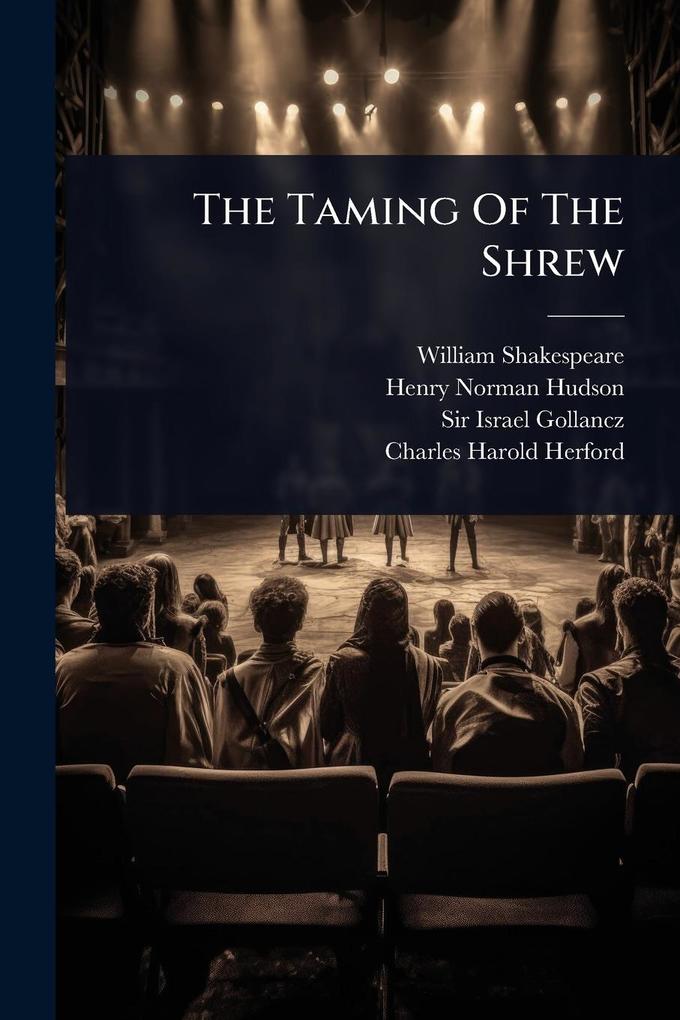
Zustellung: Fr, 25.07. - Mi, 30.07.
Versand in 2 Wochen
VersandkostenfreiBestellen & in Filiale abholen:
â € œ The Taming of the Shrewâ € is one of William Shakespeareâ € (TM)s most popular and enduring comedies. This edition features the complete and unabridged text of the play, accompanied by the famous Temple Notes. These notes, compiled by eminent Shakespearean scholars Henry Norman Hudson, Sir Israel Gollancz, and Charles Harold Herford, offer invaluable insights into the playâ € (TM)s language, themes, and historical context.
Set in Padua, Italy, the play revolves around the courtship of Petruchio and Katherina, the â € œ shrewâ € of the title. Katherina is known for her sharp tongue and rebellious spirit, which deters many suitors. Petruchio, undeterred by her reputation, sets out to â € œ tameâ € her through a series of psychological games and manipulations. The play raises questions about gender roles, marriage, and the nature of love and power.
This edition is perfect for students, scholars, and anyone interested in exploring the richness and complexity of Shakespeareâ € (TM)s dramatic works. â € œ The Taming of the Shrewâ € remains a relevant and thought-provoking exploration of human relationships, offering both humor and profound commentary on society.
This work has been selected by scholars as being culturally important, and is part of the knowledge base of civilization as we know it. This work was reproduced from the original artifact, and remains as true to the original work as possible. Therefore, you will see the original copyright references, library stamps (as most of these works have been housed in our most important libraries around the world), and other notations in the work.
This work is in the public domain in the United States of America, and possibly other nations. Within the United States, you may freely copy and distribute this work, as no entity (individual or corporate) has a copyright on the body of the work.
As a reproduction of a historical artifact, this work may contain missing or blurred pages, poor pictures, errant marks, etc. Scholars believe, and we concur, that this work is important enough to be preserved, reproduced, and made generally available to the public. We appreciate your support of the preservation process, and thank you for being an important part of keeping this knowledge alive and relevant.
Set in Padua, Italy, the play revolves around the courtship of Petruchio and Katherina, the â € œ shrewâ € of the title. Katherina is known for her sharp tongue and rebellious spirit, which deters many suitors. Petruchio, undeterred by her reputation, sets out to â € œ tameâ € her through a series of psychological games and manipulations. The play raises questions about gender roles, marriage, and the nature of love and power.
This edition is perfect for students, scholars, and anyone interested in exploring the richness and complexity of Shakespeareâ € (TM)s dramatic works. â € œ The Taming of the Shrewâ € remains a relevant and thought-provoking exploration of human relationships, offering both humor and profound commentary on society.
This work has been selected by scholars as being culturally important, and is part of the knowledge base of civilization as we know it. This work was reproduced from the original artifact, and remains as true to the original work as possible. Therefore, you will see the original copyright references, library stamps (as most of these works have been housed in our most important libraries around the world), and other notations in the work.
This work is in the public domain in the United States of America, and possibly other nations. Within the United States, you may freely copy and distribute this work, as no entity (individual or corporate) has a copyright on the body of the work.
As a reproduction of a historical artifact, this work may contain missing or blurred pages, poor pictures, errant marks, etc. Scholars believe, and we concur, that this work is important enough to be preserved, reproduced, and made generally available to the public. We appreciate your support of the preservation process, and thank you for being an important part of keeping this knowledge alive and relevant.
Produktdetails
Erscheinungsdatum
22. Mai 2025
Sprache
englisch
Seitenanzahl
170
Autor/Autorin
William Shakespeare
Verlag/Hersteller
Produktart
kartoniert
Gewicht
245 g
Größe (L/B/H)
234/156/9 mm
ISBN
9781024936698
Bewertungen
0 Bewertungen
Es wurden noch keine Bewertungen abgegeben. Schreiben Sie die erste Bewertung zu "The Taming Of The Shrew" und helfen Sie damit anderen bei der Kaufentscheidung.









